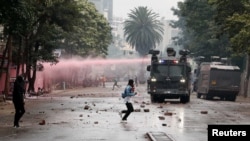Catherine Wanjeri wore a bright yellow shirt and vest with “PRESS” emblazoned on it when Kenyan police shot the K24 television journalist three times in the leg.
At the time, Wanjeri was covering protests in the city of Nakuru over proposed tax increases.
“I am very lucky and blessed to be alive,” Wanjeri told VOA from the Nakuru Annex Hospital. “The person who shot me was at a very close range to me, so they would see me clearly.”
Three rubber bullets penetrated Wanjeri’s leg. The journalist and the Kenya Union of Journalists both told VOA the shots were fired from a police car.
“I cannot walk because of an officer who deemed it fit to shoot me,” Wanjeri said. “He was aboard a police vehicle, which was indicated on the car’s driver side.”
Several journalists witnessed the shooting and came to Wanjeri’s aid.
The incident has been condemned by the Kenya Union of Journalists, which is demanding accountability.
“We demand action against the trigger-happy police officer who targeted a journalist,” David Indeje, program officer for the Kenya Union of Journalists told VOA. “An officer from the vehicle was shooting along the streets and that is how Catherine was shot.”
Dozens of journalists marched through Nakuru’s streets to the Central Police Station on Wednesday in protest. They carried banners and posters with photos of the injured Wanjeri and chanted slogans including, “Journalism isn’t a crime” and “Don’t kill the messenger.”
Indeje told VOA that police attempted to see Wanjeri while she was hospitalized, but union members intervened.
Wanjeri said she wants answers.
“All I am asking is the Kenyan National Police Service to provide us with who shot me ’cause they know who it was,” Wanjeri said. “And he needs to be apprehended and taken to court and for justice to take its course.”
Dozens of protesters have clashed with police and at least one has been killed and hundreds injured during the demonstrations, according to Kenya’s Human Rights Commission.
And the Vienna-based International Press Institute has documented more than a dozen cases of journalists detained or injured by police — or attacked by protesters while covering the nationwide protests.
Kenya’s Independent Policing Oversight Authority did not respond to VOA’s email requesting comment or information on the case.
Media being injured by police is a global problem, with UNESCO documenting a rise in cases of journalists attacked or injured covering protests.
From January 2015 to August 2021, UNESCO registered incidents in at least 101 countries where journalists were attacked while covering protests, public demonstrations and riots. At least 13 were killed.
While some cases included physical or verbal assaults directed at media from protesters, UNESCO found police and security forces responsible for most attacks. Cases included journalists injured by rubber bullets and other so-called non-lethal ammunition fired by police.
In Kenya, the name of the officer and the agency he works for has not been released by authorities.
Journalism watchdogs are calling for a thorough investigation and accountability.
“The International Federation of Journalists (IFJ) joins its affiliate, the Kenya Union of Journalists, in condemning this horrendous act of brutality meted out to a journalist while exercising her duties, and urges the Kenyan authorities to conduct a thorough investigation,” IFJ director, Louis Thomasi, wrote to VOA in an email.
And the Committee to Protect Journalists described the shooting in a statement as a “deeply alarming development in a pattern of violence faced by the press.”
“Kenyan police should be focused on ensuring the safety of journalists, not targeting them with violence or detention, and authorities should act swiftly to hold accountable those responsible,” said Angela Quintal, head of CPJ’s Africa program, in the statement.
The Media Council of Kenya said the Independent Policing Oversight Authority must act to stop the impunity in which police attack journalists.
A Kenyan court this month ruled that police acted unlawfully in an unrelated case, when prominent Pakistani journalist Arshad Sharif was shot dead at a makeshift checkpoint in October 2022, in a region about two hours from Nairobi.
The court ordered one of Sharif’s widows to be compensated with $77,000 and ordered authorities to punish the police involved.
Wanjeri told VOA she doesn’t know when she will be released from the hospital. She needs time to recover and complete physical therapy.






